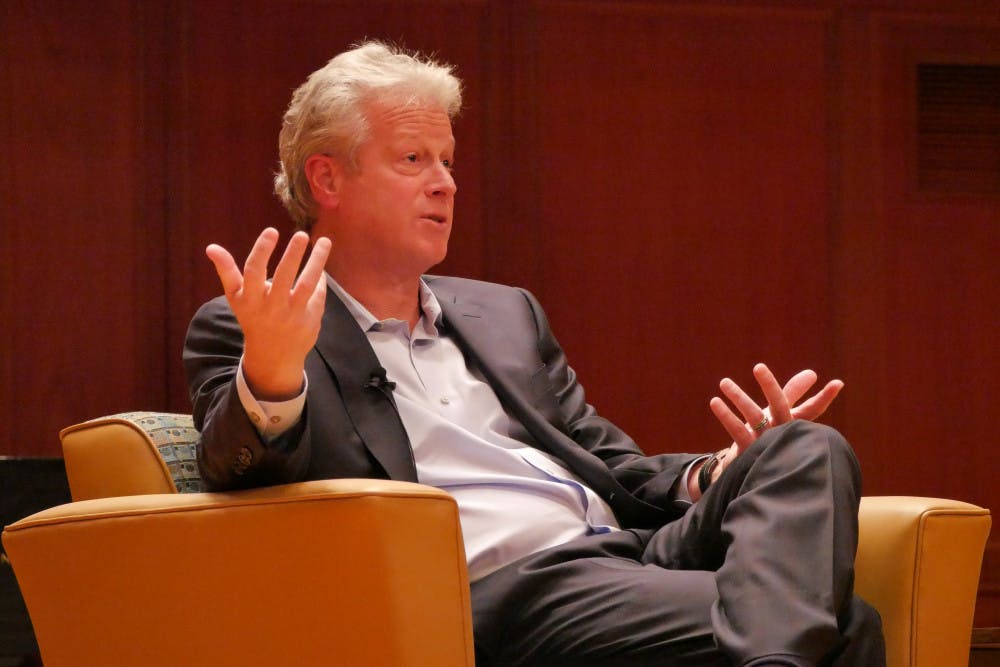By Nicole Viviano
News Editor

As part of the Alumni Lecture Series, the College welcomed Andy Polansky (’83), CEO of the global communications and marketing solutions firm Weber Shandwick, on May 1 at 4 p.m. in Mayo Concert Hall.
Following a brief introduction by the lecture’s host, Dean of the School of the Arts and Communications Maurice Hall, Polansky worked through a slideshow detailing his professional journey and a video showcasing his company’s social impact work.
Hall and Polansky further discussed the speaker’s career path from his time at the College to the present day.
“I think for students to see one of their own who sat where they sat achieve this level of success, not only for it's a credit to the education you get at TCNJ, but it's a credit to the fact that they too can do this,” Hall said.
With a wide range of international clients and a demanding travel schedule to match, Polansky discussed the importance of knowing a client, their culture and being a good listener to understand the two aspects.
“You have to be very tuned in to what the local culture is, how one communicates most effectively in that market given that culture,” he said.
Polansky detailed the essential task of comprehending a company and possible future client to get the job done. When a client is in the market for a public relations firm, the values of that company are as important as its financials.
Polansky described during a merger how one of the companies did very lucrative business with a tobacco manufacturer, but was eventually phased out to the end of its contracts, due to the misalignment with his company’s core values.
“You always want to make sure the work you're taking on is aligned with the values you have as a firm,” Polansky said.
A key point the CEO brought to the audience’s attention was the unpredictability of where a degree can lead, and the necessity for drive as a new job seeker.
“I felt like what he was saying was very, very true — how you can major in a lot of different things, but it's really the initiative you put out there ... and you can just go in whatever field you really want as long as you’re doing it yourself,” said senior international studies major Surya Ramesh. “I thought he was a prime example of that.”
Primarily attended by students and faculty, the lecture opened for questions at the end of the event, allowing for a continued conversation with the speaker on his life experience and advice.
“When he talked about how when someone interviews you, they're really looking for how you are as a person … I felt like that was really true during my interview,” said Peiling Yang, a senior marketing major.
The difference between life experience and school or job experience was a distinction Polansky mentioned as a hot topic about which future employers will ask. He advised students to research the exact company for which they wish to work.
“I think students need to be proactive and take initiative and recruit the firms that they are interested in working for,” said Polansky. He said that students must “do so in a clever, distinctive way” in order to be noticed.
Polansky started out in his first business position visiting 46 states in four years. Regardless of the destination, connecting with people was of the utmost importance to him. Collecting intellectual capital as a CEO for his firm and listening to how people feel and think are among his duties.
“As I took on more managerial responsibility for our global network, I began to travel to different offices, meet our colleagues, understand our business operations in those markets and of course, importantly our customers, our clients in those markets,” Polansky said.
Hall was pleased to have Polansky speak at the College, this being the second attempt to get him on campus. The speaker’s continued involvement with the College, including his role as a member of the TCNJ Foundation Board of Directors, is among the reasons he was honored with the Alumni Citation Award in 2015 for extraordinary commitment to the College after graduation.
“The key thing that I want students to come away with is the idea of how important a good education is, how important it is to be innovative and to take responsibility for your own learning,” Hall said.







